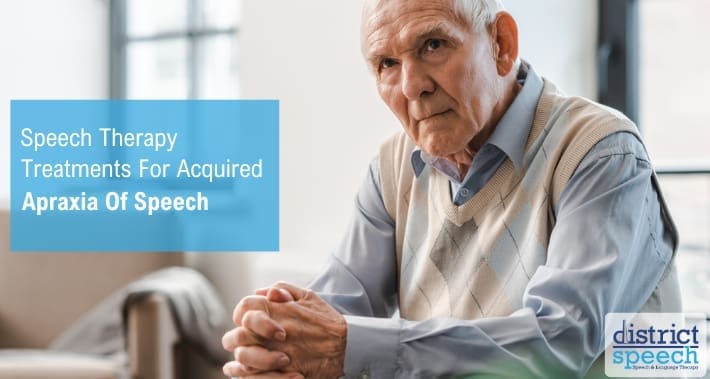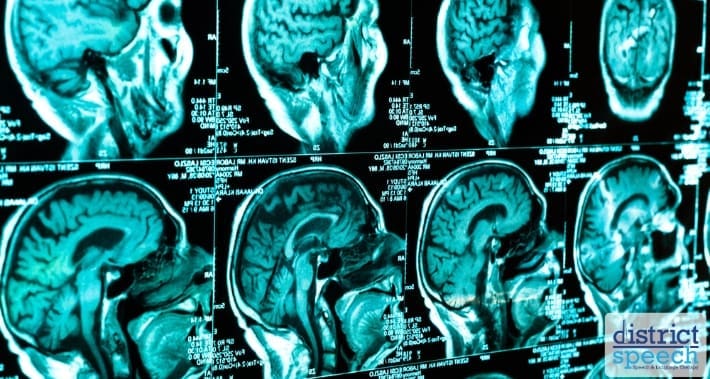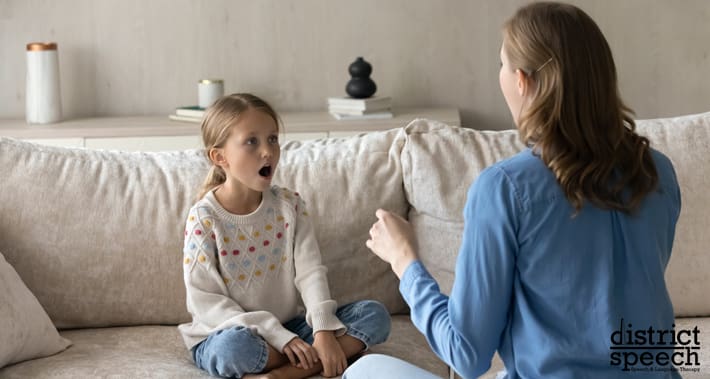
Acquired apraxia of speech is a condition that makes everyday communication extremely difficult.
The communication difficulties associated with acquired apraxia of speech can negatively impact wellbeing in a variety of ways.
For instance, acquired apraxia of speech can make it particularly difficult to maintain relationships or employment.
Far too often, speech disorders negatively impact your mental health and may result in poor self esteem, social isolation, and other mental health concerns.
At District Speech and Language Therapy, our adult speech therapy services can help.
Keep reading to find out more about acquired apraxia of speech and how our speech therapy clinic can play a role in its treatment.
What Is Acquired Apraxia Of Speech?
Acquired apraxia of speech is a neurologic speech disorder.
It can reduce your ability to control the muscles responsible for forming words.
People living with acquired apraxia of speech experience a disruption between the messages that are sent from the brain to the mouth.
When this happens, it becomes difficult for your lips and tongue to move in the correct manner to form words.
Contrast this with childhood apraxia of speech.
Symptoms and treatment for childhood apraxia of speech are similar; however, they differ in cause.
RELATED ARTICLE: FAQs About Childhood Apraxia Of Speech
As the name suggests, acquired apraxia of speech is acquired later in life.
Conversely, childhood apraxia of speech occurs either due to a genetic condition or a traumatic brain injury obtained shortly after birth.
Acquired apraxia of speech often occurs alongside other speech disorders, such as aphasia and dysarthria.
RELATED ARTICLE: How To Communicate With An Adult With Aphasia
Symptoms Of Acquired Apraxia Of Speech
The most common symptoms of acquired apraxia of speech include the following:
- Phenome distortions, such as the inability to form distinguishable sounds to form words, or using distorted or additional sounds
- Reduced overall speech rate
- Difficulties with using syllables, such as adding extra syllables into words
- Using equal stress across all syllables in a word
Acquired apraxia of speech may also affect your articulation, rate and prosody, and fluency.
RELATED: Speech Therapy For Fluency Disorders
Acquired apraxia of speech symptoms surrounding articulation include:
- Voice errors, difficulty distinguishing between voiced versus unvoiced consonants, such as saying “fog” instead of “dog”
- Prolonged phonemes, including stretching out sounds of words
- Inconsistent articulation errors
- Telescoping of syllables, including omitting or collapsing syllables, such as saying “sgetti” instead of “spaghetti”
Acquired apraxia of speech symptoms surrounding rate and prosody include:
- Slow overall speech rate
- Alternating motions rates, such as repeating a single syllable rapidly
- Poorly sequenced sequential motion rates, such as rapid repetition of a sequence of syllables
Acquired apraxia of speech symptoms surrounding fluency include:
- Disrupted fluency with attempts at self correction
- Difficulty initiating speech, may have false starts and restarts
- Sounds and syllable repetitions
It’s worth noting that the fluency symptoms are essentially the signs of a stuttering disorder, so speech therapy for stuttering will take a similar approach.
RELATED ARTICLE: Famous People Who’ve Stuttered
What Causes Acquired Apraxia Of Speech?
Acquired apraxia of speech is often caused by any condition that affects your brain’s pathways and structures responsible for planning motor movements of speech.
Examples of such conditions include:
- Stroke
- Traumatic brain injury
- Brain tumors
- Surgical trauma
- A progressive disease, such as dementia or Parkinson’s disease
On some occasions, acquired apraxia of speech presents as the first or most prominent symptom in a degenerative condition, such as corticobasal degeneration or progressive supranuclear palsy.
These cases are referred to as “progressive apraxia of speech”.

Screening For Acquired Apraxia Of Speech
Screening for acquired apraxia of speech typically occurs before a comprehensive evaluation.
The purpose of screening is to identify areas that need further assessment and provide early intervention.
To date, there isn’t any specific standardized tools used to screen for acquired apraxia of speech.
Instead, your speech therapist will look for signs of coexisting language, cognitive, communication, and swallowing difficulties associated with other conditions.
Your speech therapist may also recommend a hearing test to rule out hearing loss as the culprit for your symptoms.
RELATED ARTICLE: How Can Hearing Loss Affect Your Child’s Development?
A screening may result in one or more of the following:
- Recommendations for rescreening
- Comprehensive assessment
- Referral for other examinations
The purpose of a comprehensive assessment is as follows:
- Identification of impairments in body structure and function
- Identify comorbid, or coexisting deficits
- Identify limitations in activity and social participation
- Consideration of environmental or personal factors that serve as barriers to communications, such as language barriers
- Identify quality of life issues caused by communication difficulties, such as unemployment

How Can A Speech Therapist For Acquired Apraxia Of Speech Help?
According to the American Speech-Language-Hearing Association (ASHA), treatment options for acquired apraxia of speech primarily focus on increasing efficiency, effectiveness, and naturalness of communication.
At District Speech and Language Therapy, we provide a variety of options to meet these goals.
Treatment techniques are either restorative or compensatory.
Your speech therapist will also help you organize a practice schedule as well as provide regular feedback regarding your progress.
Now, let’s take a look at some of the speech therapy treatment approaches for acquired apraxia of speech.
1. Sensory Cueing
Sensory cueing approaches for acquired apraxia of speech focus on several different types of sensory cues, including tactile and visual cueing.
These strategies help teach movement sequences for speech.
In tactile cueing techniques, your speech therapist will apply pressure to your face, neck, and head as a cue for correct speech production.
Alternatively, visual cueing may use tools such as a mirror or computer to provide cues for correct speech production.
2. Articulatory Kinematic
Articulatory kinematic approaches for acquired apraxia of speech focus on proper mouth movements for speech production.
Attention is paid to improvement in rhythm and speech rate and may include the aid of external cues.
In sound production treatment, for instance, your speech therapist may get you to repeat similar words, such as “big” and “fig”, while simultaneously opening and closing your fist to simulate the blast of air required to produce those words.
3. Word And Phrase Focused Approaches
Word and phrase focused approaches for acquired apraxia of speech focus on correct speech production of specific words or phrase.
For example, script training helps individuals speak efficiently on a few personally relevant topics.
In this approach, your speech therapist will help you practice specific phrases, so they eventually become automatic and natural to pronounce.
According to a 2010 study by Youmans et al., script training can help adults with acquired apraxia of speech improve their confidence, as well as their speaking ease and naturalness.
4. Rhythm and Rate Control
Rhythm and rate control approaches for acquired apraxia of speech focus on melody, rhythm, and stress patterns to improve speech production.
For example, melodic intonation therapy requires the use of intonations, such as singing, to improve speech production.
Your speech therapist will sing a phrase to you and have you attempt to sing it back.
Over time, reliance on intonation is gradually reduced.
Book Your Appointment With District Speech and Language Therapy Today
Has acquired apraxia of speech been interfering with your life?
You don’t have to struggle alone.
At District Speech and Language Therapy, we are passionate about helping you improve your speech so that you can return to your roles and responsibilities in your social life.
Book your appointment with our clinic today to explore our options aimed at helping you improve your communication skills.
1300 I St NW, Suite 400 E,
Washington, DC 20005
- https://g.page/districtspeech
District Speech and Language Therapy specializes in speech therapy, physical therapy, and occupational therapy solutions, for both children and adults, in the Washington D.C and the Arlington Virginia areas.